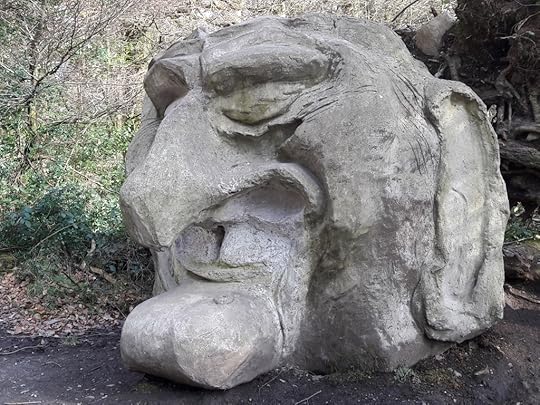Gargantuan and the Pilgrim Salad
Hello,
This week’s word, gargantuan, is with thanks to the excellent copy of “Brewer’s Dictionary of Phrase and Fable” which I found second-hand in Charlie Byrne’s bookshop in Galway city. It’s a wonderful maze of a shop and I struggle to leave without buying many books. You have been warned.
I’m reading slowly through the book and am currently on page 497 of 1213 because I’m making notes as I go – wordy inspiration for future books and of course for the Wordfoolery blog.
The word gargantuan is an eponym as Gargantua was a character created in 1534 by the French author, physician, and priest François Rabelais (1494-1553) for his four novel masterpiece “Gargantua and Pantagruel”. The books, written for an educated court audience, were satires which drew on legends, romances, and classical works. His life was varied in the extreme and his work was accused of heresy and obscenity. You can read more about him here.
 The gargantuan head of the Cailleach Beara at Slieve Gullion park
The gargantuan head of the Cailleach Beara at Slieve Gullion parkIt’s believed that Gargantua’s name came from the Spanish and Portuguese word garganta (gullet or throat). It’s worth noting that Old French had the word gargole (throat) whose roots lie in Latin’s gula (throat) and lead us to the verb gargle.
Gargantuan is nowadays used to describe something as large or nearly impossible (a gargantuan task, for example). Gargantua was a giant, but he was best known as a voracious giant so perhaps gargantuan should refer to a giant appetite rather than a large task. Either way the use of gargantuan as a word for enormous dates to the late 1500s in English.
Brewer adds some extra information to this giant tale. Gargantua was borrowed by Rabelais from either Celtic or Medieval legends where he was famous for his large appetite. In Rabelais’ story Gargantua once swallowed five pilgrims and their staves, in a salad. Somehow I hadn’t imagined pilgrim salad being standard giant fare, but I’m not an expert on the eating habits of giants. The giant later became proverbial as a big guzzler – he was referenced for this in “As You Like It” by William Shakespeare c. 1598, for example.
Until next time, happy reading, writing, and wordfooling,
Grace
p.s. some subscribers to the blog have reported not getting the blog emails – please let me know in the comments if this is happening to you. I’m following up.



